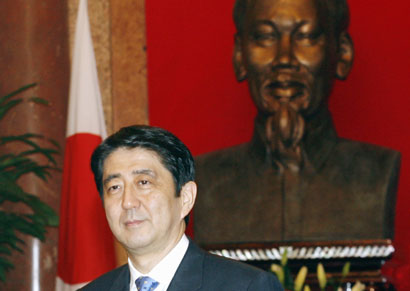Asia-Pacific
Most Japanese favor non-nuclear policy
(AP)
Updated: 2006-11-20 13:57
 |
Large Medium Small |
Abe: Japan won't debate going nuclear
HANOI, Vietnam - Japanese Prime Minister Shinzo Abe pledged Monday that his government will not debate the sensitive issue of possessing nuclear weapons, and warned that the resumption of long-stalled nuclear disarmament talks with North Korea must yield concrete results.
Abe's comments came at the end of the Asia-Pacific Economic Cooperation forum in Hanoi, Vietnam, where he urged the leaders of the world's nuclear powers to push harder for disarmament.
"During summit meetings, I told the leaders that Japan will stick to its three non-nuclear principles," Abe said. "Japan is different from other countries in that it has suffered a nuclear attack. We feel it is our mission to lead efforts to get the nuclear powers to reduce their arsenals."
"In my meeting with the Chinese leader, I reiterated that Japan will not obtain nuclear weapons," Abe said. "I also spoke of the necessity for nuclear countries to reduce their arsenals."
Speaking at a news conference before returning to Tokyo, Abe also pledged "that my government, and the Liberal Democratic Party in its official meetings, will not debate possessing nuclear arms."
The touchy question of whether Japan should discuss the bomb has come to the fore in Tokyo following North Korea's first atomic test on October 9. Japan is considered a prime target of North Korean weapons and some in Abe's government - including Foreign Minister Taro Aso - have publicly suggested Tokyo should allow a reexamination of its non-nuclear policy.
Abe's government is intent on boosting military cooperation with the US and making Japan a more influential player in the world, but the prime minister has repeatedly attempted to squelch debate by insisting he would stick to the core policy of not possessing, developing or allowing the introduction of nuclear weapons in its territory.
The issue, however, is not going away. Just last Friday, Defense chief Fumio Kyuma triggered an outcry among opposition lawmakers by suggesting Japan should reconsider its ban on allowing nuclear weapons into its territorial waters.
Japan is the only nation to have suffered an atomic bomb attack, when the United States dropped nuclear weapons on Hiroshima and Nagasaki near the end of World War II.
North Korea was a main focus of the APEC meeting, where Abe and other Japanese officials lobbied other nations to take a strong stance against Pyongyang's nuclear weapons program. Japan is part of the six-party North Korean nuclear disarmament talks expected to resume as soon as next month.
Members concluded the summit with an oral statement calling for full implementation of UN sanctions on North Korea and urging the regime to take steps to dismantle its nuclear weapons program.
Abe emphasized on Monday that talks alone weren't sufficient.
"I'm happy that we're going to be talking, but just talking isn't the goal. We need to produce concrete results," Abe said. "North Korea (must) take specific action toward abandoning its nuclear weapons."
The talks involve Japan, the two Koreas, China, Russia and the United States.
| 分享按钮 |



